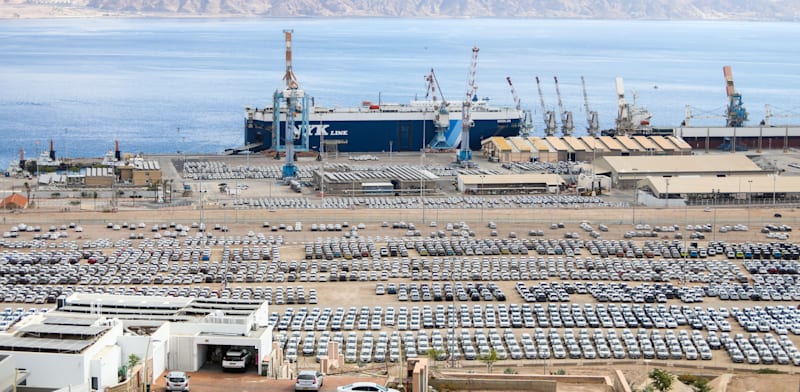Eilat Port will close on Sunday after Eilat Municipality seized its bank accounts following non-payment of municipal taxes, which are estimated at NIS 600,000-700,000 per month. The port has not been operating fully since the outbreak of the war and the threat of Houthi attacks on shipping using the Red Sea.
The closure of the port will be a blow to the Israel Navy, which has used its facilities since the start of the war and will also adversely affect the Europe Asia Pipeline Co. (EAPC), and exports of potash from ICL’s Dead Sea Works.
Initially Eilat Port denied reports of its imminent closure, insisting it would reach a settlement with the municipality and saying it was cooperating with the mayor. But a letter from the National Emergency Authority obtained by Globes confirms the details. The letter says, “Following the shutdown of Eilat Port for ongoing operations and the economic situation it has found itself in as a result of the continuing crisis, the Eilat Municipality has notified the port management of the seizure of all of the port’s bank accounts due to financial debts to the municipality. Due to this, a notice has been received from the Shipping and Ports Authority that Eilat Port is expected to close and cease all activity starting this coming Sunday.”
It adds that the significance of this is: stopping all port activity; disabling the port’s tugboats and vessels; stopping assistance to the Israel Navy in the Red Sea theater; stopping the export of potash from ICL plants; Stopping aid to the EAPC port; it also says, “If the situation continues, a decline in the port’s equipment and long-term damage to the continuity of its functioning is expected as a result of the shutdown of cranes, electrical systems, etc.”
Emergency meeting
The report was also forwarded to the Ministry of Transport, whose director general Moshe Ben Zaken has told “Globes” that he has called an emergency meeting on the subject, with the participation of government ministries, the Eilat Municipality, and the port, in order to avert the planned closure.
The Nakash brothers bought the rights to operate Eilat Port for 15 years in 2012, with an option to extend by 10 years, for NIS 120 million. The Nakash brothers were the sole bidders at the end of the tender process with industry sources believing they had paid a low amount for the rights with estimated profits worth hundreds of millions of shekels to be made.
When the war began, the port specialized in importing vehicles, with 50% of the cars brought into Israel unloaded there. In addition, an EAPC line for transporting crude oil and exporting fertilizers and minerals also operates in the port area. According to data revealed in the discussions of the Knesset Economic Committee, the port owners withdrew a dividend of NIS 162 millio in the four years preceding the war.
RELATED ARTICLES
Compensation and assistance plan In June, the cabinet voted on a compensation plan for Eilat Port, which would be given up to NIS 15 million compensation, conditional on payment of usage fees that the port has yet to pay the state since the outbreak of the war, worth over NIS 3 million.
The government initially met the port’s demands with skepticism, given the past profits of its owners and the assumption that the security risk in operating it was embodied in the low price paid by its owners at the time of purchase. However, the port is bound by collective agreements and restrictions on its workforce management, along with the fact that the profitable unloading of cars has been cut by 100%.
In 2023, the port’s revenue was NIS 212 million while in 2024, when the Red Sea trade route was closed, revenue fell 80% to just NIS 42 million. In 2023, over 134 ships visited the port, and 150,000 vehicles were unloaded. In 2024, no vehicles were unloaded, and only 16 ships visited the port. In the first half of 2025, only 6 ships visited the port.
In the past, the port was provided with assistance as part of the business plan for the entire economy for 2023 and as part of a designated plan to assist businesses in tourism-oriented cities for the first two months of 2024. The port also received a deferral in payment of user fees to the state worth NIS 3.2 million and a state guarantee for a loan of up to NIS 30 million, of which NIS 16 million was utilized.
The government is critical of the port’s non-payment to Eilat Municipality, due to the assistance already given, and the fact that the port was privatized, and just as its owners made a profit for a decade until the outbreak of the war, so they must “take money out of their pockets” in difficult times.
But although the port is private, it is also a strategic asset of the state, and it is doubtful whether the efforts made so far have been enough to keep it open.
Published by Globes, Israel business news – en.globes.co.il – on July 16, 2025.
© Copyright of Globes Publisher Itonut (1983) Ltd., 2025.








